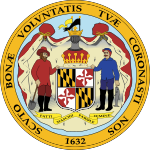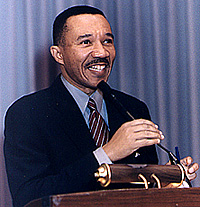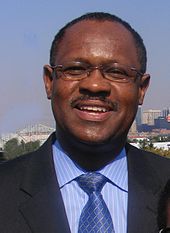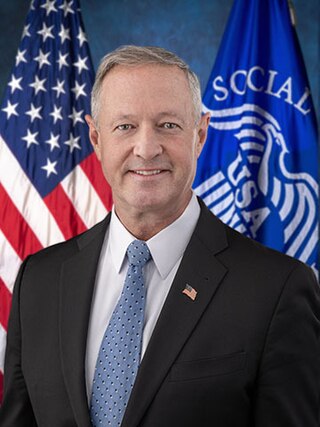
Martin Joseph O'Malley is an American politician serving as the 17th and current commissioner of the Social Security Administration since 2023. A member of the Democratic Party, he was the 61st governor of Maryland from 2007 to 2015 and the 48th mayor of Baltimore from 1999 to 2007.
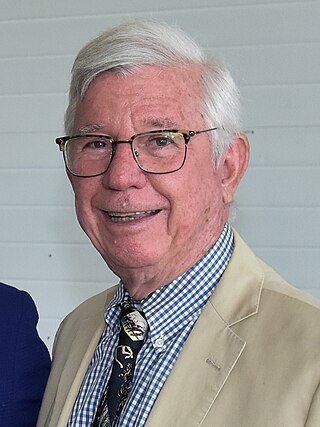
Parris Nelson Glendening is an American politician and academic who served as the 59th governor of Maryland from 1995 to 2003. He previously served as the county executive of Prince George's County, Maryland from 1982 to 1994 as a member of the Democratic Party. In 1999, Glendening was elected as a fellow of the National Academy of Public Administration.

Kweisi Mfume is an American politician who is the U.S. representative for Maryland's 7th congressional district, first serving from 1987 to 1996 and again since 2020. A member of the Democratic Party, Mfume first left his seat to become the president and CEO of the National Association for the Advancement of Colored People (NAACP), a position he held from 1996 to 2004. In 2006, he ran for the U.S. Senate seat being vacated by Paul Sarbanes, losing the Democratic primary to the eventual winner, Ben Cardin. Mfume returned to his former House seat in 2020 after it was left vacant by the death of Elijah Cummings.

The 2006 Maryland gubernatorial election was held on November 7, 2006. Incumbent Republican governor Bob Ehrlich ran for a second term, but was defeated by the Democratic nominee, Baltimore Mayor Martin O'Malley. Ehrlich was the only incumbent governor from either party to lose a general election in the 2006 midterms.
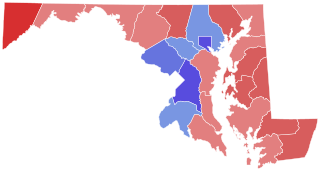
The 2006 United States Senate election in Maryland was held Tuesday, November 7, 2006. Incumbent Democrat Paul Sarbanes, Maryland's longest-serving United States senator, decided to retire instead of seeking a sixth term. Democratic nominee Ben Cardin, a U.S. representative, won the open seat, defeating Republican lieutenant governor Michael Steele.
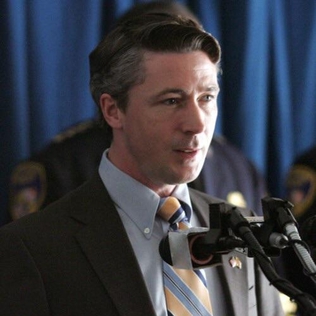
Thomas J. "Tommy" Carcetti is a fictional character on the HBO drama The Wire, played by Aidan Gillen. Carcetti is an ambitious and venal Baltimore politician who begins the series with a seat on the city council.

Sheila Ann Dixon is an American politician who served as the 48th mayor of Baltimore, Maryland, after mayor Martin O'Malley was sworn in as governor on January 17, 2007. Dixon, then president of the Baltimore City Council, served out the remaining year of her term and won the mayoral election in November 2007. Dixon was the first African-American woman to serve as president of the City Council, Baltimore's first female mayor, and Baltimore's third black mayor.

The 2007 Baltimore mayoral election was held on November 6, 2007. Because Baltimore's electorate is overwhelmingly Democratic, Sheila Dixon's victory in the Democratic primary on September 11 all but assured her of victory in the general election; she defeated Republican candidate Elbert Henderson in the general election by an overwhelming majority. Dixon, who as president of the Baltimore City Council became mayor in January 2007 when Martin O'Malley resigned to become Governor of Maryland, was the first woman to be elected to the office.
The following are politicians, family members, and assistants administrating the politics of Baltimore on The Wire.

The 2010 Maryland gubernatorial election was held on November 2, 2010. The date included the election of the governor, lieutenant governor, and all members of the Maryland General Assembly. Incumbent Democratic governor Martin O'Malley and lieutenant governor Anthony Brown won re-election to a second term in office, defeating Republican former governor Bob Ehrlich and his running mate Mary Kane.

Howard Peters "Pete" Rawlings was an American politician and the first African American to become chair of the powerful Appropriations Committee in the Maryland House of Delegates. Rawlings served the 40th legislative district, located in the central, northwest section of Baltimore, from 1979 until 2003. His daughter, Stephanie Rawlings-Blake, is the former Mayor of Baltimore.

Carl Frank Stokes is an American politician who represented the 12th district on the Baltimore City Council. He is a former member of the Baltimore City Board of school commissioners and ran for Mayor of Baltimore in 1999.
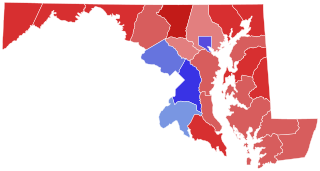
The 2014 Maryland gubernatorial election took place on November 4, 2014, to elect the governor and lieutenant governor of Maryland. Incumbent Democratic governor Martin O'Malley was term-limited and could not run for re-election to a third consecutive term.

The 1994 Maryland gubernatorial election was held on November 8, 1994. Incumbent Democratic governor William Donald Schaefer was ineligible for re-election. Prince George's County Executive Parris Glendening emerged victorious from the Democratic primary after defeating several candidates. Maryland House minority leader Ellen Sauerbrey, who would also be the 1998 Republican nominee for governor, won her party's nomination.

The 2016 presidential campaign of Martin O'Malley, the 61st Governor of Maryland, was formally launched on May 30, 2015, as Governor O'Malley announced his intention to seek the Democratic Party nomination for the presidency of the United States in the 2016 presidential election. On February 1, 2016, he suspended his campaign after a poor showing in the Iowa caucuses.

The 2016 Baltimore mayoral election was held November 8, 2016 concurrent with the General Election. Stephanie Rawlings-Blake, the incumbent mayor, did not run for reelection. Catherine Pugh won the election on November 8, 2016, with 57% of the popular vote, and took office on December 6, 2016.

The 2018 Maryland gubernatorial election was held on November 6, 2018. The date included the election of the governor, lieutenant governor, and all members of the Maryland General Assembly. Incumbent governor Larry Hogan and Lieutenant Governor Boyd Rutherford, both Republicans, were re-elected to a second term against Democrat Ben Jealous, the former NAACP CEO, and his running mate Susan Turnbull. This was one of eight Republican-held governorships up for election in a state carried by Hillary Clinton in the 2016 presidential election.

The 2020 United States House of Representatives elections in Maryland was held on November 3, 2020, to elect the eight U.S. representatives from the state of Maryland, one from each of the state's eight congressional districts. The elections coincided with the 2020 U.S. presidential election, as well as other elections to the House of Representatives, elections to the United States Senate, and various state and local elections. On March 17, 2020, Governor Larry Hogan announced that the primary election would be postponed from April 28 to June 2 due to coronavirus concerns. On March 26, the Maryland Board of Elections met to consider whether in-person voting should be used for June's primary, and recommended that voting in June be mail-in only.

A special election was held on April 28, 2020, after a February 4, 2020 primary, to fill the remainder of the term in the United States House of Representatives for Maryland's 7th congressional district in the 116th U.S. Congress. Elijah Cummings, the incumbent representative, died in office on October 17, 2019.

The Maryland Attorney General election of 2022 was held on November 8, 2022, to elect the Attorney General of Maryland. Incumbent Democratic Attorney General Brian Frosh was eligible to seek a third term in office, but announced that he would retire at the end of his term in early 2023.
